Content
Lemon verbena is a representative of the Verbena family, a perennial essential oil crop with a pronounced citrus aroma of the aerial part. It is grown outdoors in the North Caucasus for oil production. They are used in folk medicine, cooking and perfumery.
Description of lemon verbena
In its natural environment, lemon verbena grows in countries with a subtropical climate, in Russia - on the Black Sea coast, in the Stavropol and Krasnodar Territories. In cold regions, lemon verbena is grown in greenhouses or at home in flower pots. The plant has low frost resistance, the maximum indicator is -12 0C.
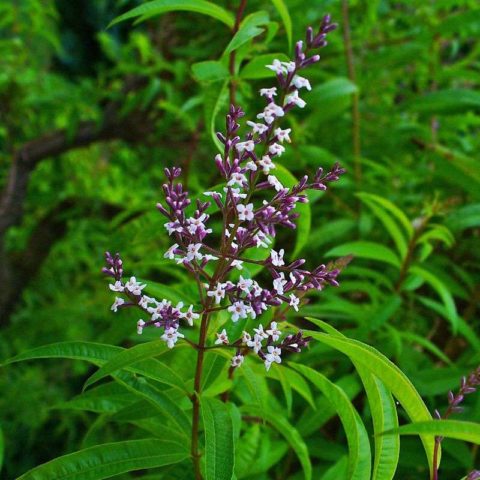
Perennial evergreen shrub also known as lemon lime
Description of the plant:
- has a spreading shape, volume and height reach two meters;
- stems are erect, with drooping tops. The structure of the shoots is hard, the surface is smooth, dark brown;
- inflorescences are formed at the tops and from the leaf sinuses;
- verbena has dense foliage, plates are oblong, narrow, lanceolate with sharp tops and smooth edges;
- location opposite or whorled. The surface is slightly corrugated, with a pronounced central vein;
- leaves are tough, with a citrus scent, light green;
- spike-shaped inflorescences consist of small, simple flowers with a purple core and light pink petals;
- pivotal root system with numerous processes;
- the fruit is a dry, hard drupe.
The plant blooms from July to autumn (until the first drop in temperature).
Breeding features
Lemon verbena is propagated in a generative and vegetative way - by cuttings.
The seeds are harvested at the end of the season, around October. They are planted in a fertile substrate in early March. Preliminarily placed in water for three days, then kept in a damp cloth for 5 days in the refrigerator.
Sowing lemon verbena seeds:
- The containers are filled with a soil mixture consisting of peat and humus with the addition of sand.
- After planting, water it abundantly and cover the container with a dark film.
- Sprouts will appear in 10-15 days, this time the containers should be at a temperature of + 25 0C.
- When the seeds of lemon verbena germinate, the protective film is removed and the seedlings are placed in a well-lit place, the soil is sprayed from a spray bottle, since the seedlings do not tolerate excess moisture well.
- After the appearance of three leaves, the verbena dive.
If propagation is carried out by cuttings, the material is harvested at the end of spring. Shoots 10-15 cm long are cut from the top of the lemon verbena. The sections are treated with an antifungal drug, placed for 2 hours in Kornevin or any agent that stimulates growth. Then they are planted in flower pots or a container with fertile soil. You can make a mini greenhouse on the site in a shaded place and cover it with foil. The seedlings will be ready for transfer to a permanent location in about 30 days.
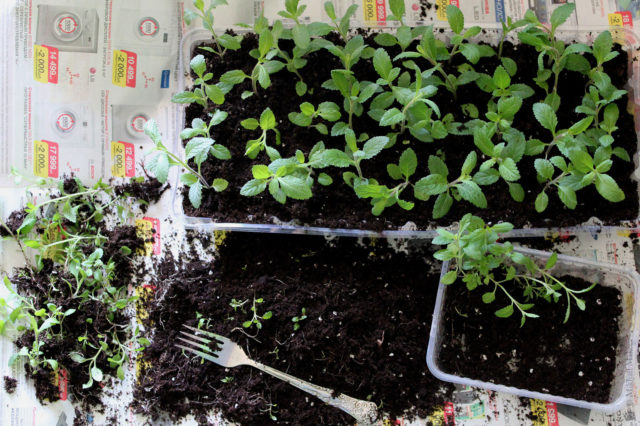
Strong specimens are chosen from the total mass and seated in separate peat glasses
Features of growing lemon verbena
Lemon verbena is planted on the plot at the beginning of the growing season, when there is no threat of recurrent frosts. Compost, peat and nitrophosphate are added to the drained planting pit.The place for the plant is allocated well-lit, since the culture is sun-loving and does not react well to the shade. After placement, pinch the tops so that the bush forms side shoots better.
The soil for lemon verbena should be with a neutral reaction, a slightly acidic composition is allowed.
In one area, verbena can grow for more than 10-15 years, the culture blooms 3 months after planting.
Outdoor care for lemon verbena is as follows:
- After planting, mulching of the root circle is recommended. This event is relevant for plants of any age. The material will help retain moisture and relieve the gardener from loosening the soil.
- Weeding is carried out at the beginning of the season, then the bush grows, completely displacing weeds.
- Watering is necessary regularly so that the top layer of the soil is moist, but stagnation of water should not be allowed, since excess moisture can cause rotting of the root and stems.
- In the spring, lemon verbena is fed with nitrogen, it is necessary for the better formation of the aerial part. At the time of shoot formation, superphosphate and ammonium nitrate are introduced, during flowering they give potassium and phosphorus. In the fall, organic matter is introduced.
- For the winter, the verbena is cut off completely, the layer of mulch is increased and covered with straw.
Lemon verbena is ideal for growing on balconies or loggias. Under stationary conditions, the plant rarely exceeds a height of 45-50 cm, therefore it does not take up much space.
A few tips for growing lemon verbena in a flower pot:
- The plant can be obtained from seeds or cuttings.
- The pot must be placed on the south or east window.
- At the beginning of summer, lemon verbena is taken out to an open area, balcony or garden so that the place is not shaded.
- The culture does not like drafts and waterlogging of the soil, these features are taken into account when watering and placing.
- You can feed at home with nitrogen-containing preparations, mineral complex fertilizers and organic matter.
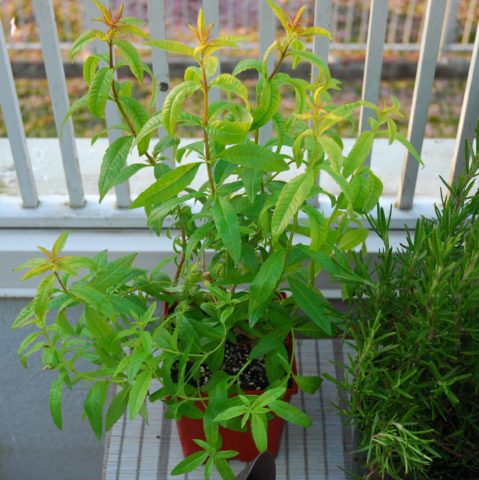
In winter, lemon verbena is watered once every 2 weeks, no feeding is needed for the rest period
You can not keep the pots near heating devices, if it is not possible to create the required temperature, the plant is periodically sprayed or placed in a pan with wet sand. At low air humidity, the leaves of verbena dry and crumble.
Cut the crop by 40% in the spring, break the tops on the remaining branches. Lemon verbena shoots quickly form substitutions and intensively build up green mass. During the season, you can break off the side shoots if necessary, and in the fall, cut off the rest.
Every 2 years, the lemon verbena is transplanted into a larger pot, the root system of the plant grows rapidly. If the container is small, the shrub begins to shed its leaves.
The beneficial properties of lemon verbena
Lemon verbena is classified as a plant with medicinal properties. The main concentration of essential oils is found in leaves and stems. The culture is grown to obtain raw materials by steam distillation. The process is laborious, the output of oils is insignificant, hence the high price of the product.
Lemon verbena contains active substances with medicinal properties:
- terpene ketones;
- photocitral;
- alcohols;
- nerol;
- aldehydes;
- geraniol;
- polyphenols;
- caryophyllene;
- glycosides.
In Arab countries, lemon verbena oil is considered an aphrodisiac that increases sex drive.
The healing properties of verbena tea
For the preparation of the drink, crushed leaves and stems, raw or dried, are used. For 200 g of boiling water, take 2 tbsp. l. raw materials. Insist for 20 minutes. Drink in the afternoon or before bed without sugar.
What are the medicinal properties of lemon verbena tea:
- Effectively eliminates seasonal viral infections, lowers fever, eliminates cough, removes phlegm from the bronchi.
- Boosts immunity. The high concentration of ascorbic acid in the stems and leaves of lemon verbena prevents the development of vitamin deficiency.
- Improves appetite, promotes the production of gastric secretions, normalizes the digestion process. Shown tea for gastritis and peptic ulcer disease.
- Relieves symptoms of asthenia, restores muscle tone, has a sedative effect, relieves irritability, anxiety, improves sleep quality, relieves headaches.
- Lemon verbena is recommended for anemia. With an abundant menstrual cycle, it has an analgesic effect.
- The culture is used for skin diseases; the chemical composition of verbena oil includes bactericidal substances that relieve itching and inflammation.
- Used in the treatment of urological diseases. A diuretic removes stones from the ureters and kidneys;
- Verbena restores liver tissue cells.
Tea is useful for high cholesterol. It has a cleansing effect, removes toxins from the body.
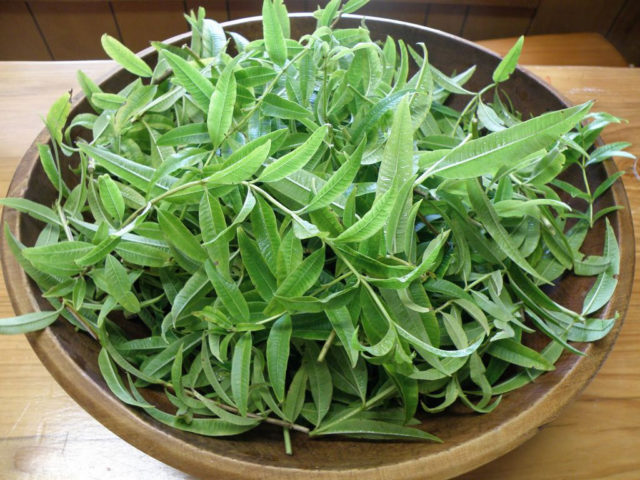
The green mass of lemon verbena can be used fresh, dried in large quantities or stored in the freezer in a freezer bag
Using lemon verbena
The beneficial properties of the culture are used in alternative medicine and in the perfume industry. Oils are often used in aromatherapy for relaxation and rejuvenation; they are used in saunas and baths.
In folk medicine
In folk medicine, decoctions and tinctures from the leaves and stems of lemon verbena are used. For this purpose, take fresh or harvested and dried in advance raw materials. You can use the flowers of the plant, but the concentration of active substances in them is lower.
For the treatment of the liver or spleen, a decoction is made, which is also effective for cholesterol plaques:
- For 500 ml of water, take 2 tbsp. l. crushed dry raw materials.
- Put on fire, boil for 3 minutes.
- The container is covered and insisted for 12 hours, it is better to make the broth in the evening.
This is the daily rate, it is divided into 2 parts, the first portion is used in the afternoon, the second before bedtime. The course is 14 days.
To improve the walls of blood vessels with thrombosis or atherosclerosis, make the following infusion of verbena:
- 3 tsp are poured into a 1 liter thermos. dry raw materials.
- Pour boiling water over.
- Withstand 6 hours, filter and refrigerate.
Drink in the daytime for 1 tbsp. l., maintaining an interval of 2 hours. When the tincture is over, take a daily break and repeat the procedure.
Fortifying, relieving fatigue and nervous tension infusion of lemon lime:
- 2 tbsp are poured into a glass. l. dry verbena.
- Pour boiling water over, cover.
- Withstand 3 hours, filtered.
Divided into 2 doses, the first dose is used in the afternoon, the second before bedtime. The course is 7 days.
Inflammatory processes in the urinary system are treated with the following decoction:
- In a container with water (500 ml) poured 50 g of dry raw materials of lemon verbena.
- Bring to a boil, set aside.
- Withstand 3 hours, filtered.
Divided into 5 doses and drunk every 2 hours, the course of treatment takes 5 days.
In aromatherapy
Alternative medicine uses lemon verbena oil for massage, which improves blood circulation by normalizing the functions of the vascular system. Eliminates spasms in the vessels of the brain, relieves pain, dizziness, nausea. Include lipia lemon oil in a complex of essential compositions in saunas or baths. The application helps to relieve fatigue, nervous tension, improves mood and quality of sleep.
In cosmetology
Lemon verbena oil is added to creams and lotions with anti-cellulite action.
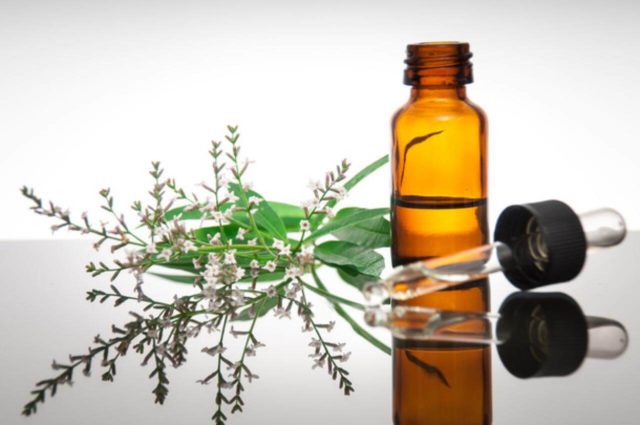
The essential oil substance is used in perfume to create a subtle citrus scent.
Products based on natural raw materials restore skin elasticity. Has a tightening effect. Relieves irritation and inflammation on the epidermis. Shampoos containing lemon verbena restore hair structure, relieve dandruff.Shower gels with lemon lipia oil, tone muscles, eliminate excessive sweating.
At home
Lemon verbena oil is used for wet cleaning of living quarters. Add a few drops of an essential substance to the water and wipe furniture, frames, doors, use for cleaning the bathroom. The citrus aroma eliminates unpleasant odors of mold and tobacco smoke.
The strong lemon scent repels insects, especially mosquitoes. A few drops of verbena are applied to cotton pads and laid out near open windows, a balcony door, especially these events are relevant at night, the aromatized substance will improve sleep and scare away insects.
Limitations and contraindications
It is not recommended to use lemon verbena tea, decoctions or tinctures in the following cases:
- with an allergic reaction to this herb;
- children under 10-12 years old;
- during pregnancy and lactation;
- with asthma;
- with unstable blood pressure.
If lime lemon oil is added on its own to a cream or lotion, start with a minimum dosage. Essential compounds can irritate sensitive skin and have the opposite effect.
When and How to Harvest Lemon Verbena Leaves
By the flowering period, lemon verbena accumulates all the necessary substances, at this time their concentration is highest. Raw materials are procured from July to September. Stems, flowers and leaves are separated. The green mass is cut into small pieces and dried in a well-ventilated room. When the raw material is ready, it is mixed, placed in a canvas or paper bag, stored in a dry place. You can not cut the parts, but collect the stems with leaves in a bunch and hang in a dark place.
Conclusion
Lemon verbena is a perennial herbaceous shrub with a pronounced citrus scent. It is cultivated on an industrial scale for the perfumery industry; essential oils are obtained from green mass. The plant is suitable for growing in flower pots. The culture has medicinal properties, leaves and stems are used in alternative medicine.








